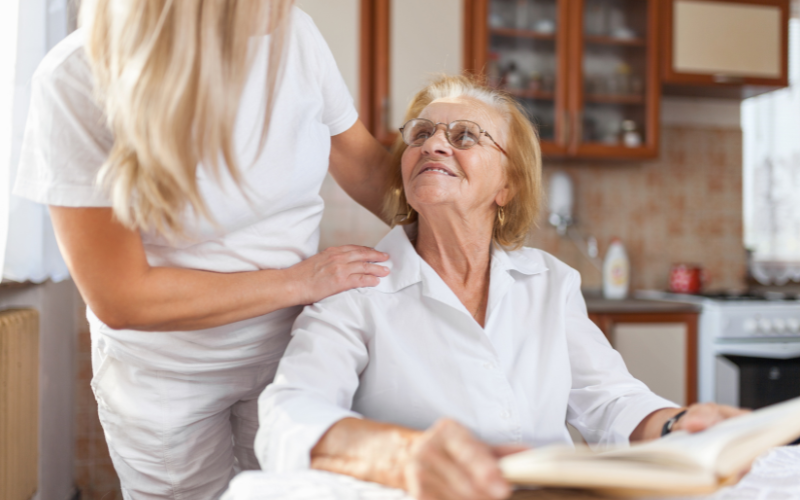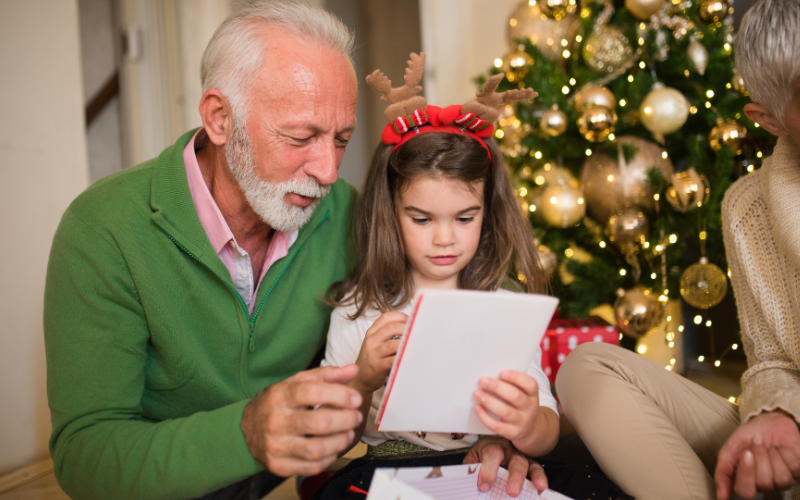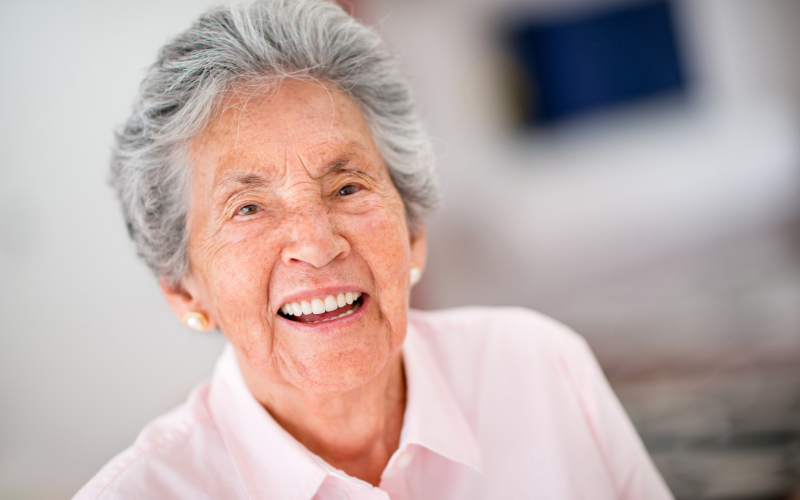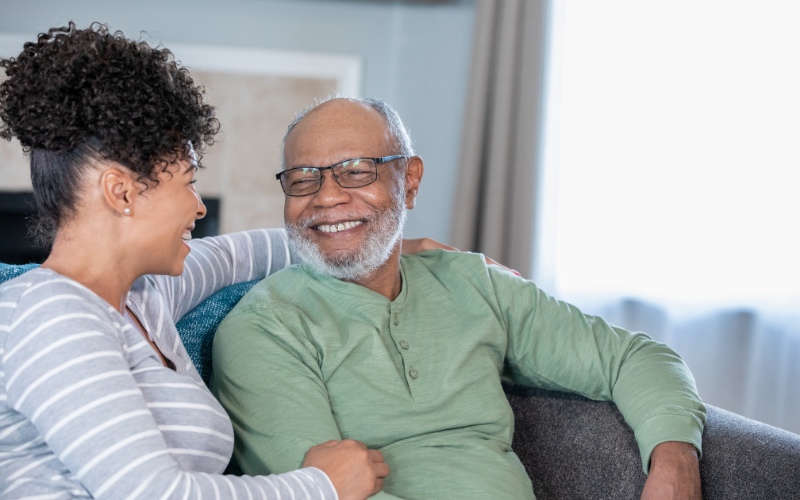
Some older adults choose to relocate from their own residences to nursing homes or other assisted living facilities, where they can receive the necessary care and support to live their later years in safety and comfort. However, this particular way of life is gradually losing its appeal.
In today’s world, more seniors are opting to remain in the comfort of their own homes as they age. This choice, known as aging in place, offers a sense of familiarity and independence. A 2021 survey by the AARP found that 77 percent of adults above the age of 50 prefer to age in place if given the choice.
However, it’s important to recognize that this option doesn’t eliminate the need for some level of care and assistance among elderly individuals. While some seniors are fortunate enough to receive support from family members, others may require the services of a professional caregiver. Regardless of the path chosen, the ultimate goal remains the same: ensuring that seniors receive the necessary care and assistance to live a fulfilling and comfortable life.
Whether they receive care and assistance from a family member or professional home caregiver, it is important that seniors aging in place are still able to maintain some independence over their lives. After all, that is the main reason why many elderly individuals choose to age at home.
With the following steps, you can help ensure that your senior loved ones can lead safe, independent lives at home.
1. Create a Safe Living Environment
Seniors have an increased risk for falling and may not have the strength needed to get around the home as well as they used to. By working to make your loved one’s home a safe living environment, you can help them remain independent, allowing them to move around the home more easily without help.
For example, remove tripping hazards like throw rugs, and add non-slip matting to slippery surfaces so that seniors have traction.
2. Upgrade the Home
When creating a safer home, you may need to make certain upgrades. Install handrails in stairways and hallways to provide seniors with something to grab onto as they walk around. In the bathroom, add grab bars to provide support which can be especially helpful given the high risk of falls in this room.
3. Make Contents Accessible
When elderly individuals can easily access their personal belongings and contents, their lives are not only easier but safer as well. There is no need to get on a stool to reach high shelves or to bend down to reach low drawers. Knowing this, help your loved ones organize their items so that it is easier to grab what they need. For example, keep everyday contents like clothing and drinkware between eye and waist level so that seniors do not struggle with grabbing what they need.
4. Move Important Things Downstairs
If your senior loved ones live in a two-story home, consider moving important items to the lower level so they do not have to walk up and down the stairs. Bring items such as their clothing, tools, and other supplies downstairs and if possible, move their bedroom to a downstairs room. There should also be a full bathroom that is accessible on the lower level. Limiting the need to walk up and down the stairs can help prevent falls and injuries, especially for seniors who have physical limitations or are prone to falling.
5. Invest in Practical Clothes
Getting dressed is a seemingly easy everyday task, but it can be difficult for seniors. Buttons and zippers can be tough for elderly individuals to use. Take the time to go through your loved one’s wardrobe and see what clothing items are and aren’t working well for them. Then buy clothing that is easier for them to wear, such as pants with elastic waistbands. Socks with rubber gripping on the soles can also be helpful to wear around the home as they provide traction.
6. Use Smart Technology
A great thing about the various smart devices available nowadays is they make life easier, especially for seniors who want to be more independent. With voice-activated home smart devices, you can easily lock doors, make phone calls, check the weather, and play music with the sound of your voice.
7. Engage in Physical Exercise
Seniors need to exercise their bodies to maintain and build their strength. This will also help make it easier for them to lead independent lives. Whether taking a walk around the neighborhood or doing a couple reps of chair exercises, the physical activity will be good for your elderly loved one.
8. Stimulate Your Brain
Your brain is also a muscle, so seniors need to exercise their minds. Elderly individuals can easily get mental stimulation by reading a book, doing word puzzles, playing board games, and more.
9. Encourage Social Activities
Part of living an independent life is engaging in activities you want to pursue. Seniors may not do this as often, instead staying at home and isolating themselves. Help your elderly loved ones find events that provide both enjoyment and socialization.
10. Be Prepared for a Medical Emergency
Medical emergencies can happen at any time, including when the senior is home alone. Seniors aging in place should be prepared for the possibility of a medical emergency. Make an emergency contact list that includes the name and phone numbers of family and close friends and put the list somewhere easily accessible, like on the refrigerator. If an emergency happens with a caregiver present, they can call a family member as soon as possible.
Seniors with medical conditions should ask their doctors about medical alert ID bracelets and necklaces. Emergency medical alert systems are another option. With these systems, the senior wears an electronic monitor that directly alerts emergency personnel if medical assistance is needed or if the senior falls or becomes lost.
11. Make Sure Seniors Have a Say
It is crucial that seniors have the opportunity to make decisions and be involved in their own care. So give elderly individuals the chance to make their voice heard.
For example, ask what seniors would like to eat. Give them a chance to partake in the cooking process even if they can only do minimal work. If they need to get some exercise, ask them what kind of physical activity they would prefer.
12. Create a Schedule
When seniors have daily structure, they have a higher sense of purpose and are not left wondering how to fill their days. So do not hesitate to help your elderly loved ones create a schedule on either a weekly or monthly basis. This can also ensure that seniors take the time they need to exercise, socialize, and attend appointments.
Senior Companion and Elderly Care Services from Assisting Hands Home Care

While many seniors prefer to age in place to remain in a comfortable environment and maintain independence in their daily lives, they often live alone. Seniors who live alone not only have a higher risk of loneliness and depression, but also do not have anyone around to provide assistance when needed or respond to emergencies. Having someone present, whether a relative or a caregiver, helps alleviate loneliness and ensures they get the care and assistance they need to age in place comfortably.
Assisting Hands Home Care offers personal care and companion services to support seniors who live alone. Our companion care services encompass both elderly care and companionship, ensuring that seniors receive the assistance they need while maintaining their independence. Our dedicated caregivers provide professional home care assistance, while also serving as companions, spending quality time with the seniors under our care.
With our elderly care and companionship services, you can feel at ease knowing that your elderly loved one has a caregiver around for when they need help and/or someone to spend time with. Call (214) 760-6944 to contact Assisting Hands Home Care and schedule a free consultation for our companion home care services in Coppell, TX | Dallas, TX | Highland Park, TX | Richardson, TX | University Park, TX, and the neighboring areas.







